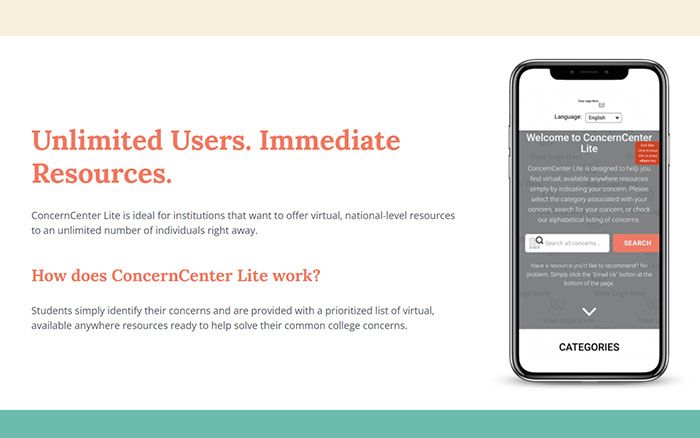In the landscape of higher education, the profound challenges surrounding the mental well-being of college students have reached alarming levels, demanding urgent attention from institutional leaders. The gravity of this issue has intensified over the past decade, with suicide now standing as the second leading cause of death among college-aged students.
As a comprehensive examination of the mental health crisis unfolds, it’s evident that the issue transcends the confines of counseling centers—it’s a pervasive campus-wide challenge that higher education leaders cannot simply hire their way out of.
This blog post delves into the findings of the American Council on Education’s (ACE) recent report, Six Considerations for Student Mental Health in Higher Education for the 2023-24 Academic Year. The report sheds light on six critical areas related to student mental health that demand attention and offers valuable insights for higher education leaders on effectively navigating this complex landscape.

1. The Crucial Role of Counseling Centers and Addressing Turnover
The first point ACE addresses is the staffing challenges faced by counseling centers. Staffing challenges in higher education have been exacerbated by the pandemic, bringing to light the strains on an already overworked system.
Reduced stigma around mental health issues before 2020 prompted an expansion of services and outreach on campuses, but the pandemic created additional caseload strains. A significant aspect of this challenge is the “great resignation,” with 60 percent of counseling centers experiencing higher-than-pre-pandemic staff turnover, as counselors sought more lucrative opportunities and autonomy in private practice or other sectors.
Employee burnout is fueled by factors such as non-competitive salaries and increased workloads due to unfilled positions. The evolving organizational structure of counseling centers, including the removal of directors, reflects a broader shift in meeting student mental health needs.
ACE urges leaders to reconsider service delivery, potentially hiring case managers to handle nonclinical issues and exploring supplemental care services like teletherapy. Moreover, to address burnout and retain staff, leaders should benchmark salaries, focus on retention strategies, and assess staff caseloads using tools like the Clinical Load Index.
Access tips regarding how to make teletherapy more sustainable for your campus here.
2. Breaking Barriers: Cultivating Inclusive Degree Pathways in Mental Health
The next point that ACE emphasizes is the importance of making it more accessible for aspiring mental health professionals, especially those who are students of color and LGBTQ+, to pursue their education and career paths.
The challenges within the mental health sector extend beyond turnover; there is a critical shortage of mental health providers across the United States, with an estimated need for over 100,000 professionals to adequately address the needs of primary and secondary schools.
The scarcity becomes even more pronounced in communities of color and for LGBTQ+ individuals. Recognizing the pivotal role that colleges and universities play, especially in training the next generation of therapists, leaders are urged to create pathways that inspire students to consider counseling careers. The report mentions that incentives such as financial aid, scholarships, and grants can encourage students from historically underserved backgrounds to explore this pathway.
Additionally, leaders should explore ways to expedite the time to degree completion, ensuring that students earn their master’s degrees more efficiently. These initiatives not only benefit the institutions by adequately staffing counseling centers but also contribute to addressing the broader mental health needs of the country.
3. Expanding Upon Positive Federal Initiatives
ACE highlights that we need to build upon the current positive movement that federal and state governments have been making regarding student mental health. The federal government, under the Biden-Harris administration, has made significant strides in addressing mental health concerns in higher education. The Department of Education’s guidance on using Education Emergency Relief Fund dollars specifically for mental health needs stands out, alongside a substantial allocation of nearly $100 million through the Safer Communities Act to support mental health and student well-being.
State leaders are also taking diverse approaches. For instance, the University System of Georgia has initiated a comprehensive mental health effort, incorporating teletherapy to ensure universal access to care. Furthermore, Utah officials are actively collaborating with public higher education institutions to implement a mobile crisis unit, anti-stigma campaigns, and crisis-worker coursework.
With mental health gaining substantial attention at both federal and state levels, college and university leaders are urged to leverage these initiatives as foundational support. By collaborating with policymakers, boards, and system offices, leaders can further advocate for and strengthen mental health support for students.
4. Embracing Data-Driven Transformation
The next topic addressed in ACE’s report is the importance of implementing evidence-based practices and documenting their impact. Effectively navigating the complex landscape of student mental health requires colleges and universities to carefully choose and invest in evidence-based practices. Despite the plethora of solutions available, not all interventions have proven effective, and the evidence is often scattered across various departments, clinics, and disciplines.
The American Council on Education’s open-access brief, “What Works for Improving Mental Health in Higher Education,”offers valuable insights derived from a comprehensive and multidisciplinary review, categorizing strategies into those with proven effectiveness, promising evidence, and proven ineffectiveness. Campuses can leverage different methods and resources for assessing program effectiveness and mental health impact.
Interested in learning more about data-driven approaches to improving student well-being? Discover how easy reporting can be on your campus.
Widely used measurements like the Healthy Minds Study and the National College Health Assessment offer periodic insights, while tools like the Wellbeing Improvement Survey for Higher Education Settings (WISHES) provide actionable data to adapt institutional structures. Disaggregating data by demographic groups is crucial for identifying and supporting struggling student cohorts.
Additionally, before adopting third-party solutions, campus leaders are encouraged to scrutinize the evidence supporting their effectiveness and ensure ongoing data collection to measure the return on investment and the actual benefits to student mental health.
5. Leaning into Public Health-Informed Solutions
The next consideration ACE emphasizes is the importance of focusing on public health and trauma-informed approaches to address mental health challenges. In the pursuit of enhancing student mental health, college and university leaders are urged to adopt a dual approach, incorporating both public health- and trauma-informed strategies.
Unlike historical reactive measures, a public health-informed approach seeks to address mental health comprehensively and proactively, emphasizing the promotion of healthy lifestyles and establishing systems for prevention, intervention, and postvention.
The JED Foundation’s JED Campus model serves as an exemplary illustration of this approach, focusing on systemic support to prevent crises. Simultaneously, recognizing the rise in pre-college traumatic incidents and the collective trauma from the COVID-19 pandemic, institutions must embrace trauma-informed approaches. Behavioral symptoms, often outcomes of coping with adverse experiences, necessitate engagement with trauma-informed professionals to frame solutions, resources, and training.
One doesn’t need to be a therapist to support students effectively. Leaders, faculty, and staff can contribute to a trauma-informed environment by fostering psychological safety, encouraging collaboration and empowerment, and practicing empathy. Leaders must acknowledge that a student’s ability to learn and academically advance depends greatly on their mental health.
One-off approaches, such as an online education module or hiring more staff in the counseling center, do not systematically address the issues that impact student mental health. Taking data into account when implementing public health initiatives and trauma-informed strategies can encourage leaders to rethink how to build resilient and adaptive structures on campus to address the root causes of their biggest challenges.
6. Beyond Orientation: The Growing Importance of Educating New Students
The final consideration from ACE’s report is to anticipate that incoming college students will expect there to be mental health support on campus. The transition from K–12 education to higher education is marked by the increasing prevalence of mental health challenges among students. Recent findings from Mental Health America indicate that a significant percentage of youth aged 12 to 17 have experienced major depressive episodes, with the impact of the COVID-19 pandemic exacerbating mental health-related emergency department visits for this age group.
High school graduates affected by the pandemic now express uncertainty about attending college, emphasizing the lasting effects on students’ perspectives. The current cohort of ninth graders, who navigated middle school during the pandemic, also faced disruption during the transition to high school, prompting increased mental health resources in K–12 settings.
The report emphasizes that campus leaders must be proactive in meeting the needs and expectations of incoming students and parents. Strategies include:
- Aligning mental health resources with pandemic-related concerns across academic departments
- Fostering outreach and partnerships with K–12 institutions
- Educating the community on appropriate mental health referrals
- Integrating mental health resources seamlessly into the college experience, particularly during the first-year journey
Key Takeaways
The insights from the American Council on Education’s recent report shed light on critical aspects of our educational landscape. As we navigate the complex terrain of campus challenges and opportunities, it’s evident that understanding and addressing the identified trends and recommendations will be instrumental in shaping the future of higher education. The report serves as a valuable resource for educators, policymakers, and stakeholders alike, offering a roadmap for fostering inclusivity, innovation, and excellence in our educational systems.
Looking for more concrete tips and ideas for enhancing your clinic’s effectiveness on campus? Check out our Q&A with Katherine Cornelius, Director of Counseling at Belmont University here to get inspired.













